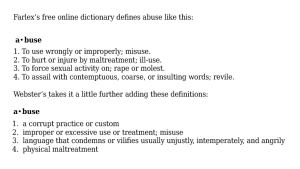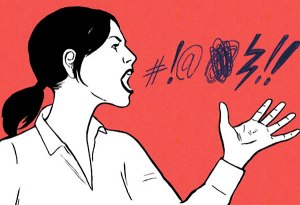
Every time I walk into a church service, I feel fear.
Every time I listen to a sermon, I wait. Wait for the words to cut and make me bleed again.
Every time I open my Bible, I flinch at the voices in my head.
This is what being a Christian has become for me. I’ve been avoiding writing about this, because anytime I think about it, I feel exposed and raw. But… church, and Christianity itself, rarely feels safe for me anymore. I don’t feel protected, I don’t feel valued, I don’t feel loved.
I am told, by Christian leaders who have followers in the millions, that my existence as a woman is inconvenient for them, these powerful men. My body is distracting to them, merely a temptation. My feelings are unworthy of their attention– the fact that I have emotions and am willing to acknowledge their rightful place makes me week, inferior.
I am told that even though I am a victim of psychological, emotional, physical, sexual, and spiritual abuse, it is within my power to bring healing without their help. They only seek to challenge me to grow outside of my bitterness and hatred. Let it go, they say, in what feels like one voice. You are the one holding yourself back. And when I ask for space, for time, for safety, I am denied. We won’t cater to the lowest common denominator. It’s up to you to bring yourself to our level, not the other way around.
So I run to my Bible, and in the Gospels I find peace. If nothing else, I can cling to Jesus, the man who loved the broken. But every time I start feeling comfortable with a book like Romans, a man in my facebook feed uses chapters 8 and 9 to tell abuse victims that we are not living the life God wants for us. We’re not mature. We’re letting our “Christian depression” get the better of us. Let go and let God they say. Or, I try to find comfort in a book like Galatians, but then I reach chapter 5 and all I want to do is run and cry and scream because all I can hear from those verses is Samantha you are wholly corrupt and doesn’t the fact you desire comfort mean you shouldn’t have it?
And then I read an article, and I spend an entire week digging into yarek naphal, a euphemism for miscarriage, and I go searching, begging for answers. From the Christians, all I receive is silence. I send out letters to famous translators, to the committees that decided to translate it miscarry, asking them why, and all I get back is three lines that mean go away and leave us big, important men alone little girl. So I turn to Judaism, and that’s where the peace begins to come. Because I don’t know what to do, what to think about Numbers 5:27 and God forcing abortions, but they speak calm and comfort. Isn’t it possible that God understood their middle-Eastern Bronze age culture? Isn’t it possible that the Sotah meant protection for innocent wives, protection from jealous husbands who had no cause to be so?
And I struggle. I wrestle with God and his church.
Because I don’t want to leave. I desperately want to stay, but it’s hard when on Sunday morning it’s the men who get a four-week mini-series on how to be epic, on how men have a vision to change the world, but women receive thank you for being our mothers. A man can fight and win against the furies to receive honor, but women, we labor to bring new life into the world, and they give us a rose.
It’s hard when on Tuesday night it seems like no one in that room understands doubt and fear and struggle. If you’re an atheist, it’s because you’re denying God. You are blatantly ignoring mountains of evidence. You are “willfully ignorant,” and look, Peter says so and all I want to do is throw my Bible across the room and scream THAT BOOK WAS PROBABLY NOT EVEN WRITTEN BY PETER.
Some days, I can’t believe in anyone besides Jesus, but I don’t even know what it means to believe. I curl up in a ball and weep, desperately clinging to the last shred of faith it feels that I have left. And then I go to church, and it feels like that last shred is being torn away from me in a cloud of dizzying confidence and practiced ease.
I wonder– am I the only one in this room who doubts? Am I the only one who struggles? I see hands being lifted up, and bodies swaying, people around me sing-shouting about the mercies of God, and I want to know do you know what that means?
I feel like a liar, a cheat, a charlatan. I sit in church, I lead Bible studies, and I realize that I can make-believe, I can pretend. The confidence, the self-assurance? It’s coming from me. I can read Esther and try to find something in it, something worth sharing, and I arrive at Bible study with my neatly-packaged truism about being like Mordecai, who didn’t know what to do, where to turn, but who didn’t spend time agonizing over it– he only did what he thought to be best, and left the rest to God. And that should be us, I say– we can only play the cards we’ve been dealt. But, mostly, I identify with Haman, and I try to say that, but there’s a nervous titter. Haman, the man who wanted to commit genocide? And I think yes, because he’s the only human character in this entire book. Haman is the one who feels real to me.
And I hate that the words of the Bible have been used to damage me, that I can still hear the voice of my cult leader screaming in my head, telling me all I need to know, and I hate that I can listen to someone I know beyond all doubt is a wonderful, loving man, who will say the exact same words. He doesn’t scream them, but he doesn’t have to.
And I hate that walking down the hallway to the auditorium feels like being led to slaughter, that the only thing that’s waiting for me in that darkened room is all my fears. I sit through the song service because of my physical pain, and I know that people probably aren’t staring, but I don’t want to look around, because I’m afraid that they are. Afraid of the people from my childhood that would have seen, and would have told me that the worship of God deserves my respect. I listen to the sermon, barely breathing, because the pastor is a good, good man, a man I know has lived through brutality, but I wait. Wait for him to say the one thing that could start to unravel me. And that won’t be what he wants, I know that, but that doesn’t help. I shrink into my seat and fight with myself just to listen.
I know I’m not alone. I know I’m not the only one struggling. Here, from my readers, I hear the same struggles. I see them played out all over the internet, on twitter, on blogs, in comments. Slowly, I realize that twitter is more my church than anything else has been. I have more communion in talking to friends I’ve never seen than I do in my church building, with people who are looking me in the eye.
I want this from my church: I want a safe place to come, knowing I am not the only one with questions, and walk with people who aren’t more interested in comfortable answers than they with walking in the gray and shadowy place with me, the place where answers come rarely, if at all.











